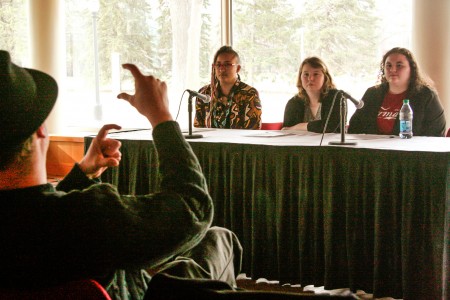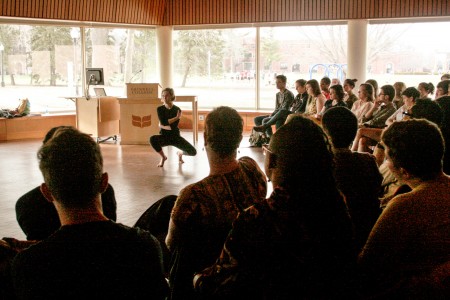The third annual Grinnell Humanities Student Symposium took place this week from Monday, April 7 to Wednesday, April 9. The symposium included student and alumni speakers addressing a wide range of topics from philosophy to crafting fiction to the politics of marginalization around the world.
The symposium was sponsored by the Center for the Humanities and organized by its director, Shuchi Kapila, English.
Student panels comprised the majority of the events throughout the symposium, with student presenters grouped together by topics ranging from feminist literary theory to how the history of slavery in the United States was affected by the Haitian Slave Revolution of 1793. Events were well-attended and the audience of students and professors were engaged and questioning.

Photo by Jenny Dong.
“For such a small campus, we consistently got a mid-size audience that was engaged and interested,” Kapila wrote in an email to the S&B.
Keynote speaker and Kirkwood Community College professor Scott Samuelson ’95 set the tone for the event with his speech, “Of Plato and Plumbers: Why We Should All Value the Humanities,” in JRC 101, as he explored how the humanities provide a number of life and career experiences and abilities that can often go unmentioned.
Samuelson explained that he introduces topics such as epistemology and metaphysics in the context of human interaction and exchange to students who can enjoy the significance of philosophy in their daily lives, and who are unlikely to pursue further degrees.
Samuelson argued that the shrinking number of students in the liberal arts and humanities was profoundly disturbing, as he posits that the goal of an education is to help people shape society. He defended the humanities for its liberating power from oppression and its role in active citizenship and freedom.
For philosophy in particular, Samuelson pointed out that the issues philosophers deal with have a widespread significance, and his goal is to reach out to people who would otherwise never have a chance to hear the thoughts of famous thinkers.
Carrie Shanafelt, English, acknowledged the difficulties that she had experienced, while teaching in a similar role to Samuelson’s, with students’ demands concerning immediate utility and employment benefits.
“At the City University of New York, I worked with a lot of students who were from all over the world,” Shanafelt said. “I have found that when you’re teaching philosophy that people who had a lot of life experience have an immediate reaction to how useful it is, to how important it is to be able and be allowed to think about things that maybe are forbidden ways of thinking.”

Photo by Jenny Dong.
The first event was a student panel called “Creative Writing.” Sam Dunnington, Alex Bazis and Dylan Fisher (all ’14) presented novellas written for a MAP program with Dean Bakopoulos, English.
None of the presenters were English majors, but they wanted to explore the study of writing in a longer form and the art of completing works of prose, which are not often taught at the undergraduate level.
The MAP project was often frustrating to writers, Bakopoulos said, but they persevered.
“You stick with it when you’re bored with it, when you’re not excited with it,” Bakopolous said. “It’s a class on the art of finishing, multiple drafts and the longer form as a sophisticated beast that is always changing.”
“I learned what it feels like to be obsessed with these people you’re writing about,” Fisher said. “They enter into every facet of your life, and you find yourself wondering what they would do in the situation that you’re in.”
The “Power, People, Borders” presentation on Tuesday examined the plights of residents in Cambodia, Haiti and India, capturing the narratives of people whose voices rarely reach our ears.
Presenter Callie Hopkins ’14 traced the story of Haitian slaves who fled North and drove the fear of rebellion into the hearts of Southern slaveowners, Lucy Marcus ’14 spoke on the marginalized and neglected locals who occupy the Indian Sundarbans and the middle of an ongoing debate between humanism and science and Jenny Mith ’14 described the legacy of biopolitics and the Khmer Rouge for Cambodian immigrants.
Other panels in the symposium included “The Erotic Gaze,” which examined the relationship between viewer and subject within film and art, “Genre Unbound,” “Reimagining the Past: New Directions in the Humanities,” explaining the transition of the humanities into the digital age, and others.
Kapila praised the variety of the panel and the academic work of the students involved.
“The immense variety of papers was evidence of the solid liberal arts education our students get at Grinnell,” she wrote. “I enjoy seeing them as professionals taking charge of their ideas and showing their professors and others the best version of their writing and creative work.”
Additional reporting by Alice Ko ’17.


















































